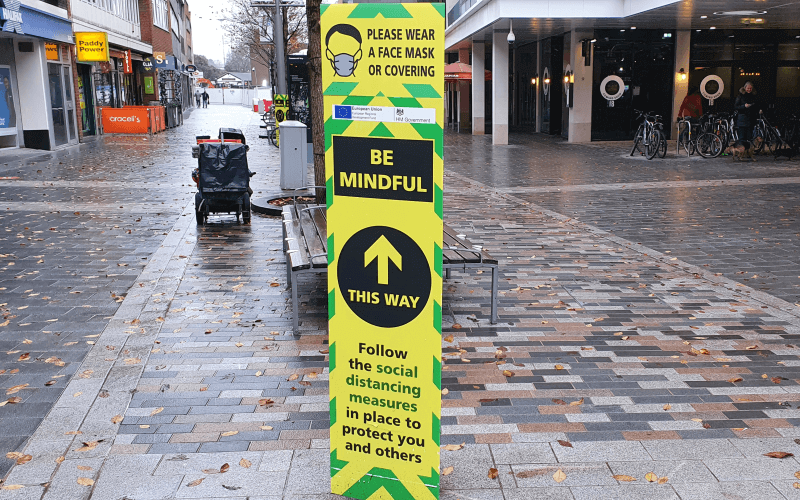Urgent action is needed to “rectify the harm caused to disabled people” during the COVID-19 crisis and to learn lessons for subsequent waves of the virus, and other future pandemics, researchers have warned.
Researchers at the University of Glasgow and the London School of Hygiene and Tropical Medicine suggest in a new paper that many disabled people felt “abandoned and forgotten” during the pandemic, while their rights had been “compromised” by the government.
And they say that the state’s response to the pandemic has “exposed and magnified existing structural failings and inequalities”, while disabled people “appear to have been an afterthought in the response to COVID-19”.
The paper is based on in-depth interviews with nearly 100 disabled people and organisations in England and Scotland about the impact of COVID-19 and the measures taken to control it.
The new research, Disabled People in Britain and the Impact of the COVID-19 Pandemic, was led by two leading disabled academics, Professor Nick Watson and Professor Tom Shakespeare.
Among their findings, they conclude that social care “was not working as it should be prior to the pandemic – and has been exposed even more during it”.
Interviewees told how they had been forced to rely increasingly on their families and other informal carers for support because of the suspension or closure of large parts of the social care system.
In some areas, the research paper says, social care assessments were suspended for up to four months, and in some parts of the country social services appeared to have been “largely absent”.
One of the disabled people the research team spoke to described how his support had been reduced from 12 hours a week to one short weekly phone call.
Another disabled interviewee, Hannah, said: “‘They’re just not answering their phones.
“Social work and that, you’re not allowed to have their email address so you’re literally… you’ve got to just sit and hope for the best that they phone you, as simple as that.
“There’s only so much anybody can take… People don’t realise like how much harder it is for people that are severely isolated, mental health or disabilities it’s been a nightmare, it really has.”
The researchers also heard that routine physiotherapy, speech and language therapy and occupational therapy sessions had been cancelled, particularly affecting younger disabled people.
And they were told that provision, repair and servicing of assistive products and daily living aids had been “severely affected” by the pandemic.
The researchers conclude that the flexible approach of voluntary sector organisations had been a “life saver” for some disabled people, and had contrasted with the failings of statutory agencies, although some described how they had received “exceptional support from individual health, social care and educational workers”.
Others spoke of how communication about the pandemic, including the easing-off of restrictions, had been “very badly handled” by the state, with many “unsure what they could and could not do, and what was safe for them and what was not”.
The paper adds: “The messaging as to which people needed to shield and which did not have continued to be unclear.”
Among their calls for urgent action, the researchers say the needs of disabled people must be “fully considered” in future responses to the pandemic.
And they say that “at a minimum and as a matter of urgency, local authorities should make it clear that social care packages will be fully reinstated and resources will be invested to address the backlog in social care assessments”.
They also call for financial support for voluntary organisations, urgent action to help disabled children catch up with their education, and priority to be given to the provision, repair and service of assistive products and daily living aids.
In the longer term, they say, there needs to be an “overhaul” of the social care system, so it becomes “responsive and human”, with secure funding.
They add: “Policymakers and social care providers must work collaboratively with disabled people and their organisations to address their needs during the rest of this pandemic and after and in anticipation of comparable future crises.”
They conclude: “Post-pandemic social change is required to enable disabled people not only to regain what has been lost through the pandemic, but also to gain full citizenship rights in the United Kingdom.”
*For sources of information and support during the coronavirus crisis, visit the DNS advice and information page
A note from the editor:
Please consider making a voluntary financial contribution to support the work of DNS and allow it to continue producing independent, carefully-researched news stories that focus on the lives and rights of disabled people and their user-led organisations.
Please do not contribute if you cannot afford to do so, and please note that DNS is not a charity. It is run and owned by disabled journalist John Pring and has been from its launch in April 2009.
Thank you for anything you can do to support the work of DNS…

 Disabled people receiving care were ‘ignored by design’ during the pandemic, Covid inquiry hears
Disabled people receiving care were ‘ignored by design’ during the pandemic, Covid inquiry hears Combined impact of different aspects of pandemic on disabled people ‘felt relentless’, Covid inquiry hears
Combined impact of different aspects of pandemic on disabled people ‘felt relentless’, Covid inquiry hears